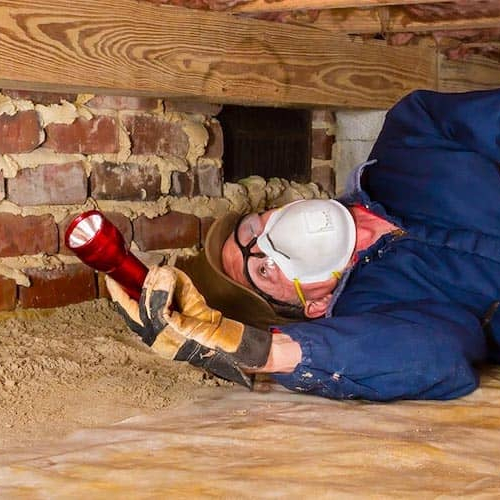Appraisal vs. inspection: A guide
Jul 18, 2025
•3-minute read

The home appraisal and inspection can be confusing. Both involve third-party professionals reviewing the home you’re buying, but for very different reasons. While the Rocket Mortgage® Learning Center provides details on these and other steps in the home buying process, understanding the difference between the appraisal and inspection can make buying a home less overwhelming.
Real estate appraisals: What they are and why they’re important
A real estate appraisal determines the fair market value of a home. A licensed third-party appraiser will compare the home’s features, condition, and location to recent nearby sales of comparable homes, known as “comps,” to arrive at an unbiased specific dollar value for the home.
Why do lenders require appraisals?
The appraisals confirms for the lender that the home is worth enough to justify the loan. Lenders won’t lend you more than a home is worth because they need to be certain they can recoup their losses by selling it if you default on the loan.
Mortgage lenders typically require an appraisal for conventional loans and government-backed loans offered through the Federal Housing Administration, Veterans Affairs, and the U.S. Department of Agriculture.
Real estate inspections: What you should know
A home inspection evaluates a home’s physical condition for safety and functionality. The inspector typically reviews the home’s structure and systems, including the roof, the electrical system, plumbing, foundation, furnace, ventilation ducts, and air conditioning. If something in the home is unsafe or not working correctly, the inspector will let you know.
Inspectors follow established guidelines from the American Society of Home Inspectors, which ensures consistent and thorough standards of practice across the industry.
This inspection allows buyers to better understand what they’re buying and whether the home needs repairs or upgrades to be safe to live in.
The inspection is optional though buyers usually require one in the purchase and sale agreement, often with an inspection contingency that lets them cancel the sale if the results are unsatisfactory.
Inspection vs. appraisal: What’s the difference?
An appraisal determines what a home is worth by evaluating its market value based on condition, location, and comparable sales. An inspection reviews the home’s condition and documents anything that may need repairs.
Home inspections vs. appraisals: At a glance
|
Feature |
Home inspection |
Home appraisal |
|---|---|---|
| Assesses the home’s value |
No |
Yes |
|
Paid for by the buyer |
Yes |
Yes |
|
Usually required by a mortgage lender |
No |
Yes |
|
Evaluates the home’s interior and exterior condition |
Yes |
Yes |
|
Identifies areas of the home that require repairs |
Yes |
No |
|
The professional must be licensed |
Yes |
Yes |
FAQ
Here are answers to common questions about the difference between a home inspection and appraisal.
What does an appraiser look for versus an inspector?
An appraiser looks at a home's value based on condition and recent sales. An inspector checks for defects in the home's structure and systems. Essentially, appraisers decide what's it worth, and inspectors tell you what's wrong with it.
Do the inspection and appraisal happen at the same time?
They can happen around the same time, but there’s no real benefit to coordinating them. Each professional works independently and focuses on different aspects of the home. You can schedule them separately based on your timeline and their availability.
What’s a major red flag during a home inspection?
Structural damage is a major red flag, especially damage to the foundation, support beams, or the load-bearing walls that keep your home stable and safe. Structural repairs are expensive and suggest problems that might worsen over time if not addressed properly.
What’s checked during an appraisal?
An appraiser checks the home’s condition and compares it to similar recent sales to see if the price is fair. They'll look at the square footage, number of bedrooms and bathrooms, the lot size, and overall condition. The appraiser also considers the neighborhood and any unique features that might affect the home's value.
What hurts an appraisal?
Things like poor appearance, old appliances, a bad layout, or safety hazards can reduce a home’s appraised value. Deferred maintenance issues, such as peeling paint, broken fixtures, or outdated systems, signal to the appraiser that the property hasn't been well cared for.
The bottom line: Home inspections and appraisals serve different purposes
Appraisals determine what your home is worth, and inspections show what needs fixing. Though they serve different purposes, both protect your investment in important ways.
Now that you know the differences between an inspection and an appraisal, are you ready to begin your home-buying journey? Apply for a mortgage and take the next step toward homeownership.

Michelle Banaszak
Michelle graduated from Michigan State University in 2011 with a Bachelor's in Communications and a Bachelor's in Studio Art. She's been writing for various companies since she graduated, and enjoys bringing stories and information to life. She currently works for Blue Cross Blue Shield of Michigan as a Communication Specialist and is a recent first-time homeowner.
Related resources

6-minute read
What does a home inspector do?
A home inspector’s job is to review a property’s systems and structures to ensure they are safe and working correctly. Learn what a home inspector l...
Read more

6-minute read
What is a 4-point inspection?
A 4-point inspection looks at a property's four major systems. Learn more about what a 4-point inspection is and why you may need one before purchasing a home.
Read more

6-minute read
What is a seller’s pre-inspection?
As a seller, you might order a pre-inspection before listing your home to address any repairs and help prevent negotiations with buyers. Find out how it works.
Read more